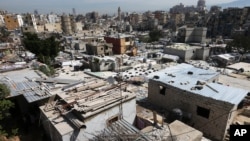KUWAIT —
Lebanon's foreign minister called on Arab countries on Monday to support the Lebanese army to counter fallout from Syria's civil war, which he said threatened to tear the country apart.
Around 1 million Syrian refugees have fled to Lebanon, a displacement that has strained public infrastructure and threatened to upset the sectarian balance.
This “is threatening the existence of Lebanon”, Gebran Bassil told reporters before a meeting of Arab League leaders in Kuwait on Tuesday.
“This would create a danger also to the whole [of] humanity, because if the Lebanese model would vanish, then a big clash is to be expected between civilisations, religions and all aspects or differences in the world,” he said, speaking English.
Power in Lebanon is split between Shi'ites, Sunnis, Druze and Christian leaders - reflecting the mixed population - and many fear that Sunni refugees, who represent the majority in Syria, could disrupt the fragile demographic balance.
Communal tensions in Lebanon were stoked last week by the fall of the Syrian border town of Yabroud to Syrian government forces and their allies in the Lebanese Shi'ite political and military movement Hezbollah.
The fighting prompted a chain reaction of car bomb and rocket attacks, roadblocks and protests along sectarian lines that took days to calm and revived memories of Lebanon's own 1975-90 civil war.
Bassil, who became foreign minister in a cabinet formed last month, said a preparatory meeting with his Arab counterparts on Sunday discussed Syria's conflict, now in its fourth year, the refugees and support for the Lebanese army.
“We hope that these decisions will be translated into reality by direct and tangible help and aid to Lebanon in backing the army, because the army of Lebanon is fighting terrorism for all the Arabs and all the world,” he said.
Bassil said the only way to protect Lebanon and its borders was to give additional support to the army. Saudi Arabia donated $3 billion to the army in December for upgrades and asked France to supply weapons using a large proportion of these funds.
“We cannot live with new military camps, whether Syrians or others, inside Lebanon,” he said. “Support for the army is something real for facing this coming danger.”
Lebanon is already home to large camps for displaced Palestinians where state authority does not fully extend. Many Lebanese trace the origins of their own civil war to militarisation in the camps in the 1970s.
Lebanon's military nowadays is religiously mixed but some Syrian rebels and Lebanese have accused it of being in thrall to Hezbollah, which has sent fighters to support President Bashar al-Assad, a member of the Shi'ite-derived Alawite minority.
In a video posted online this week, influential Lebanese Sunni militant leader and cleric Ahmad al-Assir called for Sunnis to defect from the army.
Bassil is a member of the Free Patriotic Movement, a Christian party allied to Hezbollah in the country's coalition government.
Around 1 million Syrian refugees have fled to Lebanon, a displacement that has strained public infrastructure and threatened to upset the sectarian balance.
This “is threatening the existence of Lebanon”, Gebran Bassil told reporters before a meeting of Arab League leaders in Kuwait on Tuesday.
“This would create a danger also to the whole [of] humanity, because if the Lebanese model would vanish, then a big clash is to be expected between civilisations, religions and all aspects or differences in the world,” he said, speaking English.
Power in Lebanon is split between Shi'ites, Sunnis, Druze and Christian leaders - reflecting the mixed population - and many fear that Sunni refugees, who represent the majority in Syria, could disrupt the fragile demographic balance.
Communal tensions in Lebanon were stoked last week by the fall of the Syrian border town of Yabroud to Syrian government forces and their allies in the Lebanese Shi'ite political and military movement Hezbollah.
The fighting prompted a chain reaction of car bomb and rocket attacks, roadblocks and protests along sectarian lines that took days to calm and revived memories of Lebanon's own 1975-90 civil war.
Bassil, who became foreign minister in a cabinet formed last month, said a preparatory meeting with his Arab counterparts on Sunday discussed Syria's conflict, now in its fourth year, the refugees and support for the Lebanese army.
“We hope that these decisions will be translated into reality by direct and tangible help and aid to Lebanon in backing the army, because the army of Lebanon is fighting terrorism for all the Arabs and all the world,” he said.
Bassil said the only way to protect Lebanon and its borders was to give additional support to the army. Saudi Arabia donated $3 billion to the army in December for upgrades and asked France to supply weapons using a large proportion of these funds.
“We cannot live with new military camps, whether Syrians or others, inside Lebanon,” he said. “Support for the army is something real for facing this coming danger.”
Lebanon is already home to large camps for displaced Palestinians where state authority does not fully extend. Many Lebanese trace the origins of their own civil war to militarisation in the camps in the 1970s.
Lebanon's military nowadays is religiously mixed but some Syrian rebels and Lebanese have accused it of being in thrall to Hezbollah, which has sent fighters to support President Bashar al-Assad, a member of the Shi'ite-derived Alawite minority.
In a video posted online this week, influential Lebanese Sunni militant leader and cleric Ahmad al-Assir called for Sunnis to defect from the army.
Bassil is a member of the Free Patriotic Movement, a Christian party allied to Hezbollah in the country's coalition government.





